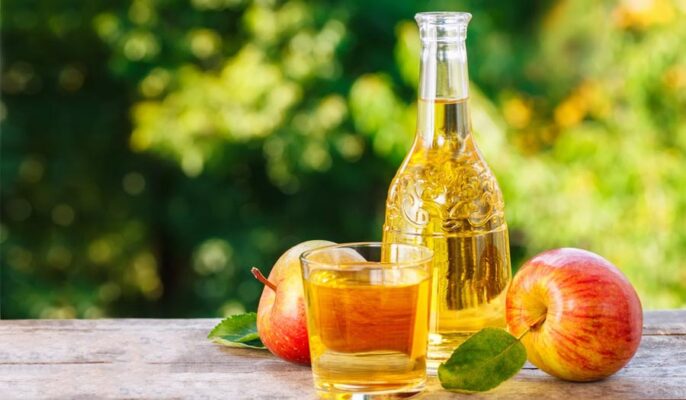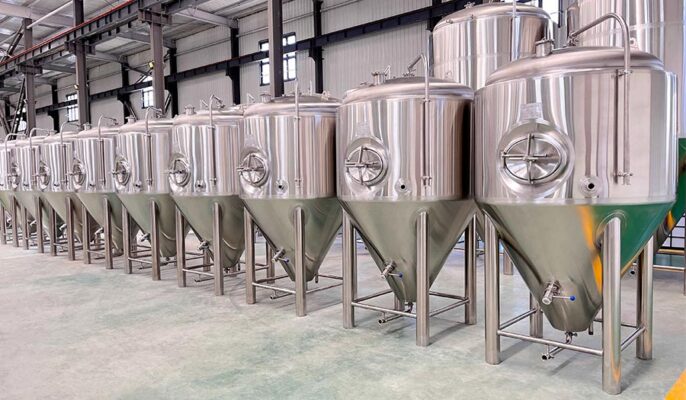Starting a cider brewery requires a certain amount of upfront start-up costs. The required capital investment will vary depending on several factors, from the necessary cider production equipment to the necessary permits and licenses, the initial investment adds up quickly. Savvy cider brewers must also consider the cost of facility leases or purchases, renovations and expansions, and branding and marketing materials.
What is a cider brewery?
A cider mill is a facility that specializes in the production of cider, with the core task of converting apples into cider. This process involves several steps, each of which has a direct impact on the flavor, quality, and safety of the final product. Cider is an alcoholic beverage made by fermenting apple juice and is widely enjoyed by consumers.
Here is the process of cider making:
Apple Handling and Pretreatment
- Apple sourcing: breweries source apple varieties suitable for brewing from specialized suppliers or plantations. Selecting high-quality apples is fundamental to ensuring the flavor of the final product. Commonly used apple varieties include the sweet Fuji and the distinctly tart Red Star.
- Cleaning and Processing: Sourced apples are first thoroughly washed to remove surface dirt and pesticide residues. After that, the apples are cored and cut for juicing. This process involves ensuring that all equipment is sanitized to avoid contamination.
- Juicing: The treated apples are pressed through a juicer to make apple juice. The juicing process ensures maximum extraction of the juice while keeping its flavor and nutrients intact.
Fermentation process
- Fermenter: The apple juice is transferred to a fermenter, which is usually made of stainless steel or glass with good sealing and temperature control. The capacity of the fermenter varies according to the scale of production, from small experimental tanks to large industrial tanks.
- Adding Yeast: Specific types of yeast are added to the fermenter, these yeasts convert the sugars in the apple juice into alcohol and carbon dioxide. The choice of yeast affects the flavor of the cider and the rate of fermentation, so it needs to be selected according to the goals of the brew.
- Fermentation control: The temperature and time of the fermentation process need to be precisely controlled. Temperatures that are too high or too low may affect the activity of the yeast and the flavor of the cider. Common fermentation temperatures range between 15 and 20 degrees Celsius, adjusted for different cider types and production requirements.
Filtration and Aging
- Filtration: Once fermentation is complete, the cider is filtered to remove yeast residues and other solids. This step improves the clarity and stability of the cider and ensures the quality of the final product.
- Aging: After filtration, the cider is usually aged. During the aging process, the cider is stored in specific containers for a certain period to enhance its flavor and texture. The length of aging affects the maturity and complexity of the cider.

Bottling and Packaging
- Bottling: Aged cider is transferred to a bottling machine for bottling. The bottling process needs to take place in a sterile environment to prevent contamination and spoilage of the cider. Bottles are usually glass or plastic, depending on market demand and brand positioning.
- Labeling and Packaging: Each bottle of cider is labeled with a label that includes product information, brand identity, alcohol content, and production date. Eventually, the bottles are packaged and prepared for distribution to the market.
What type of cider mill do you want to start?
One of the most important legal questions about your cider mill business that you need to consider in the planning stages of your business is where you want to start the business – farm or city?
Under Minnesota law, to make cider (real, pure, gluten-free spirits cider made from Minnesota apples), you need a wine license. Different laws apply depending on whether you are located on a farm or in an urban setting. Farm wineries have more flexibility in their operations; for example, the license fee is only $50.00, compared to $500.00 for an “off-farm” winery.
More importantly, farm wineries have the right to distribute their products directly to retailers. In contrast, non-farm breweries are permitted to sell their products on-site for on-sale or off-site consumption but must use a licensed distributor to distribute outside of their place of business. This distinction between farm and non-farm breweries is critical to other legal issues.
Licenses as well as Permits
Obtaining the necessary licenses and permits is a critical aspect of starting a small-batch cider brewery business. The process can be complicated and time-consuming, but it is vital to ensure compliance with local and state regulations. Specific requirements will vary by location, but there are some common elements that all cider brewery startups must address. A liquor license is probably the most important license for a cider brewery. Depending on the state, this may be a separate license or it may be part of a broader alcoholic beverage manufacturing license. The application process can take several months and often requires submitting a detailed business plan, passing a background check, and paying significant fees.
In addition to a liquor license, cider breweries must obtain various business permits and registrations, such as general business licenses, sales tax permits, federal employer identification numbers, and potentially industry-specific permits related to food safety, environmental regulations, or zoning. The application process and fees associated with these licenses may vary by location, but they are critical to legally operating a cider brewery.
Cider brewing equipment to buy
- Apple cleaning and handling equipment: apple cleaning and handling equipment is a key production facility in a cider brewery, used to ensure the hygiene of the raw material and the efficiency of the process. This equipment plays an important role in the process of apples from picking to juicing, ensuring the final quality of the cider. Apple washers remove dust, dirt, pesticides, and other impurities from the surface of apples. Hurry apples help improve the quality of apple juice and prevent contamination.
- Apple Sorters: Apple sorters are used to sort apples based on size, shape, color, or quality. This helps ensure that only apples that meet the criteria move on to the next stage of processing.
- Apple corer: Fruit corers are used to remove the core of the apple (including seeds and core) for subsequent juicing and processing. A corer can increase productivity and reduce manual handling.
- Apple Juicers: Apple juicers are used to press processed apples into apple juice. The design of the juicer can affect the efficiency and quality of juice extraction.
- Fermenters: Apple fermenters are one of the core pieces of equipment in a cider brewery and are used to convert the sugars in apple juice into alcohol and carbon dioxide through yeast fermentation. The design and configuration of these fermenters directly affect the quality, flavor, and productivity of the cider.
- Filtration equipment: Filtration equipment removes solids from the cider, such as yeast deposits, pulp fragments, and other impurities produced during fermentation. This helps to improve the clarity and flavor of the cider.
- Filling equipment: Cider filling equipment is used to fill bottles accurately and hygienically with processed and filtered cider. The selection and configuration of the filling equipment directly affects the quality of the product, the productivity, and the integrity of the packaging.
- Labeling and packaging machinery: An important investment in start-up costs is bottling, labeling, and packaging machinery. This specialized equipment is critical to efficiently and consistently producing cider products that meet industry standards and customer expectations. The cost of bottling equipment ranges from $10,000 to $50,000, depending on production capacity and level of automation.
Marketing and Promotion Plan
Establishing a strong brand image and effectively marketing a cider brewery’s products is critical. These marketing and branding efforts may represent a significant portion of start-up costs, but they are critical to building customer awareness, loyalty, and differentiation in the highly competitive craft beverage market. In addition to the initial brand investment, cider breweries need to allocate a significant budget for ongoing marketing activities. This may include website development, social media management, content creation, and various promotional activities. Depending on the scope and scale of these activities, the marketing budget may range from $20,000 to $50,000 or more during the launch phase.
Transportation
Being a cider brewing company requires investment in reliable transportation and distribution vehicles to ensure efficient delivery of products to customers and retail partners. This is a critical start-up cost that can have a significant impact on the overall operational efficiency and profitability of the business. Depending on the size of their operation and the geographic reach of their distribution network, they may need to invest in a fleet of refrigerated trucks or vans to ensure that their cider products are kept at the proper temperature and handled during transportation. In addition to transport vehicles, you may need to invest in specialized equipment for loading, unloading, and handling cider products during the distribution process. This may include forklifts, forklifts, and other material handling equipment, among others.
Personnel Training Program
As a cider brewing company, a business needs to assemble a skilled and dedicated team to handle all aspects of the operation, from cider production and quality control to customer service and distribution. The start-up costs for staffing and employee training can be very high, as companies need to recruit and hire experienced professionals in the areas of cider making, fermentation, bottling, and tasting room management. In addition, the company will need to provide a comprehensive training program to ensure that all employees are familiar with the company’s processes, procedures, and values.
- Recruitment and Hiring Costs: costs associated with job posting, candidate screening, and onboarding new employees.
- Employee Compensation and Benefits: competitive compensation programs to attract and retain skilled cider production, quality control, and customer service professionals.
- Training Program Development: Design and implementation of comprehensive training courses for a variety of job roles, including hands-on cider making, equipment operation, and customer service.
- Ongoing Training and Development: Provides regular training updates, seminars, and professional development opportunities to ensure employees stay current with industry best practices.
How much does it cost to start a cider brewery?
When starting a cider brewing company, entrepreneurs must consider several key startup costs. These costs may vary depending on the size and scope of the operation, which will also depend on factors such as equipment costs, local policies, and staff training. However understanding the typical range can help fledgling cider makers can effectively plan their financial strategy.
|
Startup Costs |
Average Range (USD) |
|
Orchard and Apple Equipment
|
$20,000-$100,000 |
|
Cider Production and Fermentation Tanks |
$7,500 – $50,000 |
|
Bottling, Labeling and Packaging Machinery |
$2,500 – $15,000 |
|
Liquor License and Regulatory Compliance |
$5,000 – $25,000 |
|
Marketing and Branding |
$10,000 – $50,000 |
|
Transportation and Distribution Vehicles |
$20,000-$100,000 |
|
Staffing and Employee Training Program |
$20,000-$100,000 |
|
Total |
$23,500 – $132,500 |
FAQ
What are the preliminary steps for a cider mill?
The preliminary steps to setting up an apple cider include market research, developing a business plan, selecting a site, applying for the necessary permits and licenses, purchasing equipment and raw materials, hiring employees, and establishing a supply chain. You also need to consider how you will do quality control and brand marketing.
What are the key considerations for equipment procurement?
When sourcing equipment, you need to consider the equipment’s capacity, efficiency, durability, maintenance costs, and suitability for your scale of production. Common equipment includes apple washers, juicers, fermenters, filters, and fillers.
What kind of permits and licenses are required?
The permits and licenses you’ll need to obtain include a brewing license, a business license, a health permit, and possibly an environmental permit. Specific requirements vary from region to region, so it’s best to check with local codes and regulations.





